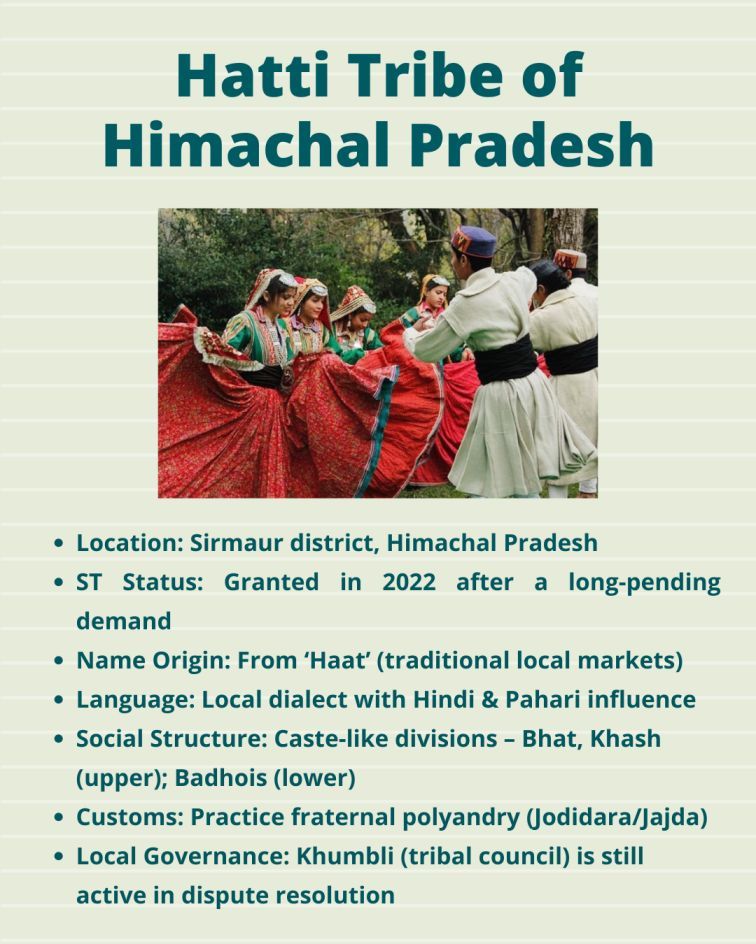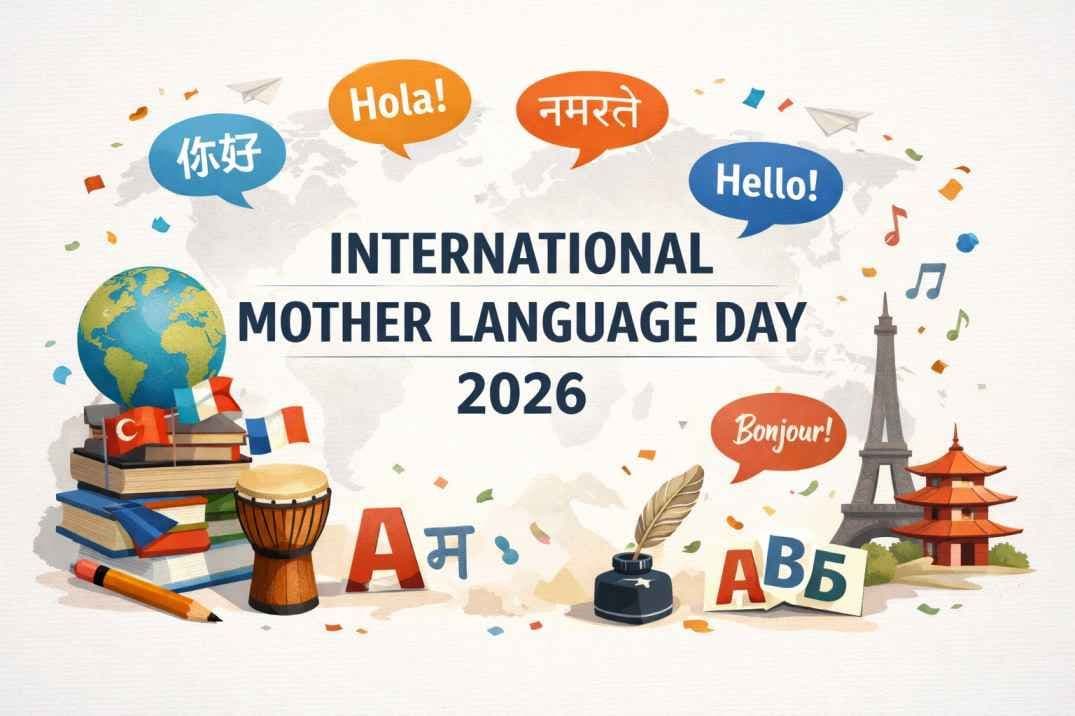Polyandry in India: Hatti Tribe Jodidara Tradition in Himachal
Aug, 2025
•4 min read
Why in News?
A woman in Himachal Pradesh’s Sirmaur district recently married two brothers from the Hatti tribe, reviving public and legal debate around their traditional practice, Jodidara. This has brought tribal customs and their relevance into the spotlight.
Why Cover This Topic for UPSC?
- Important for GS I: Indian Society – marriage customs
- Relevant for the Anthropology optional
- Linked with current affairs
- Important tribal culture and practices
- Useful for Essay & Ethics examples
What is Polyandry?
Polyandry is a form of marriage in which one woman has more than one husband at the same time. It is a rare but historically significant practice observed in certain tribal and rural societies. There are two main types of Polyandry:
1. Fraternal Polyandry (Adelphic):
- All husbands are brothers, usually sharing one wife to avoid division of family land or property.
- Example: Practiced traditionally among the Pahari tribes of Himachal Pradesh and in some parts of Tibet.
2. Non-Fraternal Polyandry:
- Husbands are unrelated to each other and may have a rotational or agreed system to share conjugal rights with the woman.
- Less commonly observed and more informal in structure.
Historical Reasons for Polyandry Tradition
Polyandry, though uncommon, evolved in specific societies due to practical and cultural needs. The following historical factors contributed to its acceptance and continuity in certain regions:
- Land preservation: Prevents division of land among brothers in agrarian societies.
- Scarcity of women: Low female population in some regions due to skewed sex ratios.
- Economic constraints: One wife shared among multiple men reduces household expenses.
- Harsh geography: In remote, mountainous regions, joint family systems were more practical for survival.
- Customary tradition: Passed down through generations as a cultural norm.
- Male-dominated migration: Men remained at home while others migrated for work; polyandry ensured family continuity.
Let’s understand the legal dimensions of polyandry in India and its acceptance.
Legal Status of Polyandry in India
Polyandry in India exists in a complex legal and cultural landscape. While legally restricted under mainstream laws, certain tribal communities continue to follow such customs under constitutional safeguards.
Is Polyandry Legal in India?
No, polyandry is not legally recognized under general Indian marriage laws. Both polyandry (a woman having multiple husbands) and polygamy (a man having multiple wives) are prohibited under:
- The Hindu Marriage Act, 1955
- The Special Marriage Act, 1954
- The Bharatiya Nyaya Sanhita (which replaced the Indian Penal Code)
These laws criminalize bigamy and promote monogamous marriages as the legal norm for most citizens.
What About Certain Tribal Communities?
Marriage practices among Scheduled Tribes (STs) can follow customary laws, which are recognized under:
- Article 342 of the Constitution (defining Scheduled Tribes)
- Fifth Schedule (governing tribal areas and their rights)
- Part XXI (special provisions for certain classes and regions)
These constitutional provisions allow tribal communities cultural autonomy, including recognition of traditional customs such as Jodidara (polyandry among the Hatti tribe) — but with conditions.
Can Customary Polyandry Be Legally Enforced?
Not automatically. For a customary law like polyandry to hold legal weight, it must be:
- Certain – clearly defined and uniformly followed
- Reasonable – not arbitrary or harmful
- Consistent with public policy – should not violate basic rights or legal principles
When challenged in court, such customs must be proven with evidence to show they are an accepted, time-tested practice within that community.
Example: In Himachal Pradesh, the Hatti tribe and some Kinnauri communities have practiced fraternal polyandry historically, especially in agrarian, land-holding families.

Now, let’s take a look at how the judiciary has responded when personal customs clash with constitutional rights.
Customs vs Constitution: Key Supreme Court Rulings
The Supreme Court has consistently upheld that while India respects cultural diversity and traditional practices, customs must evolve in harmony with the Constitution. When traditions infringe upon equality, dignity, or fundamental rights, they are subject to judicial scrutiny and can be declared unconstitutional.
| Case | Year | Issue | Supreme Court Rulings |
|---|---|---|---|
| Triple Talaq (Shayara Bano v. UoI) | 2017 | Instant divorce under Muslim law | Struck down as arbitrary and violative of dignity and equality (Art. 14 & 21) |
| Sabarimala Case | 2018 | Ban on women’s entry into the temple | Declared discriminatory; customs can't override gender equality (Art. 14, 15, 21) |
| Ram Charan v. Sukhram | 2025 | Tribal women denied succession | Custom struck down for violating equal rights under Article 14 |
These rulings highlight that while traditions matter, they must never come at the cost of constitutional rights.
Prepare this current topic here: PM Modi at Gangaikonda Cholapuram: Understanding the Chola Legacy of Bharat
Way Forward: Bridging Tradition and Constitutional Morality
As India continues to uphold its pluralistic fabric, it must also ensure that customs grow alongside conscience. A balanced, inclusive approach is essential.
- Community Dialogue: Foster awareness within tribes on aligning customs with individual rights.
- Legal Literacy: Inform communities and officials about legal limits on marriage practices.
- Consent-Centric Practices: Ensure traditions prioritize free and informed consent, especially for women.
- Cultural Respect, Not Harm: Uphold tribal identity while curbing discriminatory customs.
- Sensitive Policymaking: Design policies that balance cultural context with gender justice.
Traditions are not static—they evolve. The goal is not to erase them, but to shape them into ethical legacies that honor both culture and Constitution.
Prepare UPSC Current Affairs with SuperKalam!
- Stay updated on global and national issues with our Daily News Analysis
- Practice mains answers with Instant Mains Answer Evaluation
- Build your study momentum with streaks and leaderboards
Start Now—it's FREE and take advantage of personalized guidance to crack the UPSC with confidence and clarity.
Explore SuperKalam's Resources and set yourself on the path to success!


